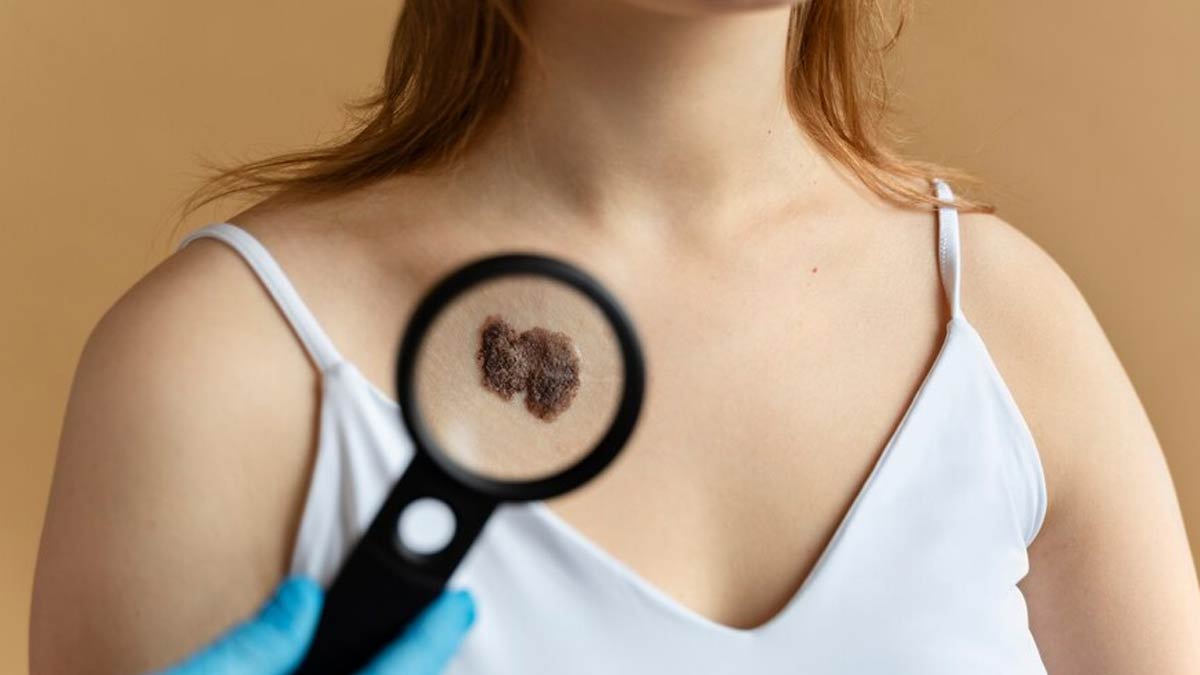
Skin cancer is one of the most common types of cancer globally, but when detected early, it is also highly treatable. Understanding the early signs and symptoms is essential for timely intervention and effective treatment. We spoke to our expert Dr Chinjitha T Davis, Associate Consultant – Dermatology, Manipal Hospital, Goa, who listed the early signs of cancer and how to seek immediate medical advice if any concerning symptoms arise.
Table of Content:-
Types Of Skin Cancer

Skin cancer occurs when abnormal cells in the skin begin to grow out of control. There are four important types of skin cancer, namely:
- Melanoma
- Squamous cell carcinoma
- Basal cell carcinoma
- Merkel cell carcinoma
According to the American Academy of Dermatology (AAD), over 3 million Americans annually are affected by Nonmelanoma Skin Cancer (NMSC), which includes basal cell carcinoma and squamous cell carcinoma. If identified early and treated effectively, basal cell and squamous cell carcinomas can be successfully treated.
Risk Factors For Skin Cancer

Dr Davis listed the risk factors for skin cancer as follows:
- Excessive Sun Exposure
- Sunburn
- Fair Skinned Individuals
- Genetic Susceptibility
- Genetic diseases like Xeroderma Pigmentosum
- Arsenic Exposure
- Chemical Exposure
- Immunosuppressive Drugs and Conditions
- Chronic Skin Conditions
- Prior Radiation Exposure
- Burn
- Human papillomavirus
- Smoking
- Large number and size of nevi
- Family history of skin cancer
Also Read: Powerful New Skin Cancer Therapy Cuts Risk Of Death By Half
Understanding the Early Signs Of Skin Cancer
Here are some signs of skin cancer that you should watch out for, as listed by the expert:

Changes in Moles
Pay attention to any patches or moles on your body. Look for changes in size, shape, colour, or texture. Irregular borders, asymmetry, or variations in colour within the same mole could indicate skin cancer.
New Growth or Sore
Pay attention to any new growths, lumps, or sores that don't heal within a few weeks. These could be early signs of skin cancer, particularly if they continue to grow or bleed. It can be mostly asymptomatic and sometimes painful or Itchy.
Persistent Scaly Lesions
Persistent rough scaly lesions in a photodamaged skin or anywhere else could be a precancerous or cancerous lesion, warranting prompt medical evaluation.
Persistent White or Red Patch in Mucosa
If you notice a persistent white patch or red patch in your oral mucosa or genital mucosa, consult a dentist/dermatologist as it could be an indication of precancerous lesions.
Also Read: Skin Cancer Symptoms Go Beyond A New Mole: Can Be Mistaken For Benign Skin Conditions
What You Should Do
Dr Davis listed some measures that you should follow to prevent or treat cancer as follows:

Regular Skin Self-Examinations
Perform a monthly self-examination of your skin to check for any abnormalities or changes. Use a mirror to inspect the hard-to-see areas and consider taking the help of a partner for areas at the back side of the body.
Schedule Annual Dermatological Check-ups
Visit a dermatologist annually for a full-body skin examination, especially if you have a family history of skin cancer or significant sun exposure history.
Practice Sun Safety
Protect your skin from harmful UV rays by wearing sunscreen with a high Sun Protection Factor(SPF), seeking shade during peak sun hours, wearing protective clothing, and using hats and sunglasses.
Avoid Tanning Beds
Refrain from using tanning beds, as they emit harmful UV radiation that increases the risk of skin cancer.
Avoid Drinking Arsenic-Contaminated Water
Refrain from consuming water from boreholes or wells in arsenic-affected areas. Chronic arsenic exposure can lead to various skin malignancies.
Seek Medical Attention Promptly
If you notice any suspicious changes in your skin or experience persistent symptoms, don't hesitate to seek medical advice. Early detection and treatment significantly improve outcomes for skin cancer patients.
Bottomline
Dr Davis concluded, “Recognising the early signs and symptoms of skin cancer empowers individuals to take proactive steps in protecting their skin health. By staying vigilant, practising sun safety, and seeking timely medical attention, we can reduce the chances of skin cancer and ensure better outcomes for ourselves and our loved ones. Remember, early detection saves lives.”
[Disclaimer: This article contains information provided by a registered healthcare professional and is for informational purposes only. Hence, we advise you to consult your expert if you notice any signs of seeking necessary treatment.]
Also watch this video
How we keep this article up to date:
We work with experts and keep a close eye on the latest in health and wellness. Whenever there is a new research or helpful information, we update our articles with accurate and useful advice.
Current Version